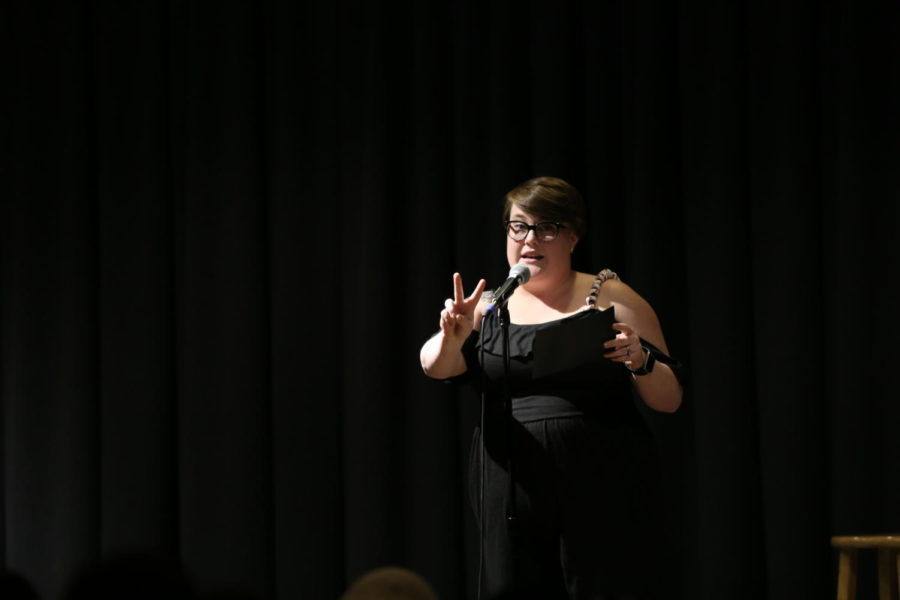Vagina monologues features stories surrounding identity and experience
Danielle Peterson/Iowa State Daily
Katie Steigleder, who is currently working on her second bachelor’s degree in student affairs, performs one of the monologues during the Vagina Monologues Friday Feb. 15 in the Sun Room. Some monologues were performed on V-Day, a global activist movement to end violence against all women and girls.
February 17, 2019
Twenty-two individuals who identify as women got on stage Thursday and Friday to perform The Vagina Monologues to speak about identity and experience.
The monologues cover topics such as body image, genital mutilation and reproduction. This is done through personal monologues performed by women of various ages, races and sexualities.
The performers wore all black with a piece of rope featured in their outfit. The rope was to represent the national Vagina Monologues theme of the year, incarcerated women, and the chains that are imposed on women.
“During the show I ask you to think about a couple of things. Think about the identities that are represented and how they are represented,” said Natasha Hill, one of the directors. “And think about the identities that are missing.”
The Vagina Monologues, brought to Iowa State in 2001 by one of the directors of the production, Alissa Stoehr, is put on by the Margaret Sloss Center for Women and Gender Equity, Student Union Board and the Society for the Advancement of Gender Equity.
The monologues were directed by Natasha Hill, a senior in global resources systems, Breanna Kass, a master’s student in student affairs, Margaret Kaus, a Green Dot graduate assistant and Som Mongtin, the assistant director of the Sloss Center.
“At first women were reluctant to talk. They were a little shy. But once they got going, you couldn’t stop them. Women secretly love to talk about their vaginas. They get very excited, mainly because no one’s ever asked them before,” states the introduction piece for the monologues.
After the introduction piece, 16 other monologues were performed including “My Vagina Was My Village,” “The Little Coochi Snorcher That Could” and “I Was There In The Room.”
“The Woman who Loved to Make Vaginas Happy,” performed by Vashalice Howard, a graduate student in the school of education, talked about a women who quit law to pleasure other woman. In the end, Howard demonstrates different moans that can be heard, such as the clitoris moan, the college moan and the surprise triple orgasm moan.
“I realized moans were best when they caught you by surprise, they came out of this hidden mysterious part of you that was speaking its own language. I realized that moans were, if fact, that language.”
Other monologues, such as “Not-So-Happy Fact” and “My Vagina was My Village” touched on genital mutilation and rape.
Some of the monologues, such as “My Angry Vagina,” performed by Molly Zenk, a sophmore in women and gender studies and international studies, elicited laughter from the audience when speaking about tampons, gynecologist visits and thongs.
The last two monologues performed were original pieces titled “Remember Them” by Anasia Sturdivant, an Iowa State graduate who works full time for ACCESS, and “The American Dream” by María B. Alcívar Zuñiga, a Ph.D student in human development and family studies.
“Remember Them,” spoke about the disproportionate incarceration of women of color. In “The American Dream,” Zuñiga spoke about the national narrative surrounding immigration and the racism she has faced at Iowa State.
The program handed out before the performance included a content warning because of the use of transphobic language, female genital mutilation, sexual violence and war and child sexual abuse. ACCESS advocates were located outside of the Sun Room for those who wanted to process the content of the performance.
The program also addressed the voices heard, and not heard in Eve Ensler’s script. One of the conditions of receiving rights to the script is it can not be altered in any way.
All of the profits from the Vagina Monologues goes to ACCESS.
“I liked the different perspectives and that there’s a lot of visibility of different backgrounds,” said Cassie Plata a senior in electrical engineering.
Other audience members appreciated the awareness the monologues bring and the intersectionality of the story.
















